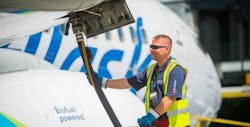Alaska Airlines partnering on mission to increase Sustainable Aviation Fuel
U.S. carrier Alaska Airlines has announced a new partnership with energy firm Shell Aviation to expand the sustainable aviation fuel (SAF) market.
Under this partnership, the two companies will work together to define and overcome challenges involved in SAF technology, development, infrastructure and investment, the Seattle, Washington-based airline says.
SAF is a renewable fuel that can be produced from various sources, such as agricultural wastes and used cooking oils. It can lower lifecycle greenhouse gas emissions by approximately 80 percent in its neat form when compared to traditional petroleum-based fuels.
The agreement focuses on deepening knowledge and understanding of the technology, infrastructure, carbon accounting systems and public policy support required to bring SAF to more markets in greater quantities and at a more sustainable long-term cost.
The companies will prioritize enabling supply to the West Coast and tackling fueling infrastructure challenges in the Pacific Northwest. As part of the agreement, Shell Aviation will also supply up to 10 million gallons of neat SAF to Alaska Airlines at its hub in Los Angeles.
“Alaska Airlines has set our course to net zero by 2040 and sustainable aviation fuels represent the greatest near-term opportunity to make a step-level change on that journey,” said Diana Birkett Rakow, Senior Vice President for Public Affairs and Sustainability at Alaska. “That’s why we’ve pioneered SAF technologies for more than a decade. But we can’t scale the market alone.”
“We’re excited to take this next step in the journey with Shell, to leverage their deep knowledge of the energy industry, its infrastructure requirements and supply chain to make lower lifecycle carbon SAF more widely available for the future,” Rakow added.
The carrier said both companies share an ambition to help scale the SAF market by addressing cost and volume by implementing several strategies to grow the availability and commercial viability of SAF.
“We’re excited to expand our strong relationship with Alaska and amplify our efforts to help decarbonize aviation through SAF supply on the West Coast and in the Pacific Northwest,” said Jan Toschka, President of Shell Aviation. “We need support from the entire ecosystem to build a sustainable future for aviation. This deep level of collaboration will help us put the technologies and supply chain in place to advance the industry.”
Multiple airlines and air travel industry firms are experimenting with sustainable aviation fuel, including Delta, JetBlue, Boeing, Air Canada, Bombardier and British Airways.
